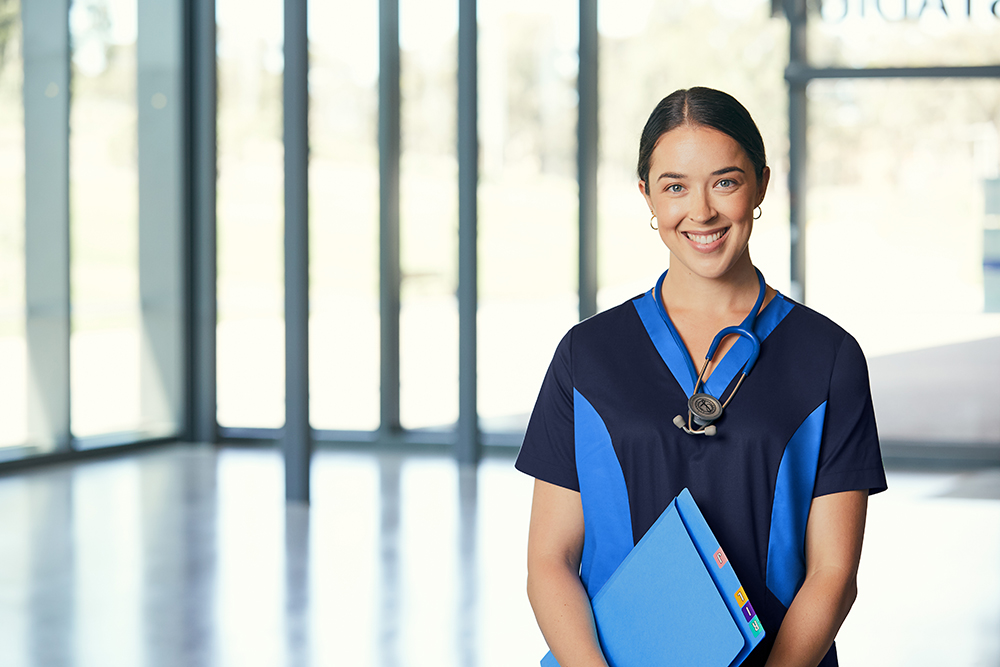Welcome to our Q&A series behind the incredible talent from the Health and Wellbeing Autumn / Winter 2021 campaign.
Meet Georgie. In 2020 amidst the chaos of a pandemic she landed her dream job as an Intensive Care Nurse and just completed her post graduate studies to become a Critical Care Registered Nurse (CCRN).
She loves caring for the mind and body, is a qualified yoga teacher, and when she's not in scrubs on shift, you'll find her upside down on her yoga mat or walking barefoot along the beach with a coffee in hand.
Why did you choose a career in healthcare?
There’s two key driving forces behind why I absolutely love working in healthcare as a Critical Care Registered Nurse. For as long as I can remember I’ve always taken on a caring and nurturing role with the people around me. More recently I’ve conceptualised it as what I believe to be my purpose in life: the use of self – my skills, knowledge, understandings, and own experiences - to help and empower others live their best life possible. For me, that manifests as providing love, care, compassion and support to people when they’re unwell and needing treatment in hospital. I’m also absolutely infatuated with the human body. Every day I’m blown away by how amazing our bodies are and just how hard they work to keep us feeling happy and healthy. And when the body needs a bit of extra help, I’m in awe of the technologies and medicines available to help keep us alive. This is a job where I’ll never stop learning and growing, and I absolutely love that.
What is the most rewarding part of your role?
One of my favourite mantras is ‘Show up, smile, and make a difference’. It’s a privilege to be part of someone’s journey during a period of ill health when they might be having the worst day of their life, and to have the opportunity to make a difference for them. Be it making them a hot up of tea, extending a hand to hold when they’re in pain, sitting down and listen when they’re afraid or unsure, being their voice when they cannot advocate for themselves, providing education, or playing a role in ensuring they’re getting the best and most appropriate treatment, I love that my job allows me to have an impact in so many ways. People often say “I could never do your job”, and I often counter that by saying “I could never do yours”. It’s an absolute honour to be a nurse.
What has been the hardest part of working during a pandemic?
I’m hyper aware that where I work in Australia (Melbourne) we’ve been far less affected by the pandemic than in other parts of the World, and for that I am extremely grateful. During the hard lockdowns in Melbourne I still got to go to work with business as usual (albeit wearing an extra few items of PPE and having pandemic protocols in place), so my life didn’t change all that much. I had a job with guaranteed income, we had no PPE shortages, we had strong policies and procedures in place to protect us, and I could socialise with my work friends and colleagues.
With that in mind, I’d have to say it’s been hard knowing that healthcare professionals in other parts of the World have been pushed to their absolute limits and then further again, and that at this point in time things don’t really seem to be slowing down. I cannot even begin to fathom what it’d be like working on the frontline in a city that’s experiencing hundreds to thousands of cases a day, where hospitals are over capacity and short on staff and equipment. My heart goes out to those on the front line in the badly affected countries.
What advice would you give to other health care workers like you who are at the front
lines?
Check on yourself as much as you check on your patients. Get familiar with your soft and hard limits, always keep an eye on burnout, prioritise sleep and rest, marinate yourself in compassion, know that it’s okay to speak up and ask for help, and never be afraid to tap out in order to protect your own health and wellbeing. You can’t pour from an empty cup, and it’s no good for anyone if you lose the cup entirely.
How do you practice self-care?
I’d have to roll on from my answer above; I hold a high standard for taking care of myself with the same compassion and energy as I do for my patients. This is something I’ve continued to develop throughout my career – it definitely didn’t come to me naturally when I first started nursing. One thing I focussed on in 2020 was setting boundaries and learning to stick to them. Putting myself first requires conscious decision making for me - I naturally always put other people’s needs ahead of my own - so learning to prioritise myself has been revolutionary for both my mental and physical health. I also have a strong meditation practice, I love cooking delicious vegetarian food, I get outside in nature as often as possible, and I practice yoga regularly.
If you could design your own uniform, what would it look like?
My favourite colour is yellow (both a lemony-butter kind, and a rich golden sunflower type), and I don’t think I’ve ever seen a full-on bold pair of yellow scrubs. So, if I could design my own pair of scrubs they’d be yellow (maybe with lilac accents), high waisted with a soft, string tie waist band, nicely fitted bottoms - maybe even with a 70’s flare kind of vibe (let’s make flares a statement in the scrub game), cuffed sleeves on the top, and lots of pockets, including a zip pocket on the top that’s big enough to zip in your phone (the amount of times my phone has fallen out of my pockets and on to the floor when I’m showering someone is ridiculous!). Oh, and of course some socks, a hair scrunchie, and a long sleeve under-scrub top to match in with the whole aesthetic. Imagine how happy you and your patients would be when you’re dressed in yellow – it’s such a joyful colour!
Thank you, Georgie, for being a part of our Health and Wellbeing campaign.





